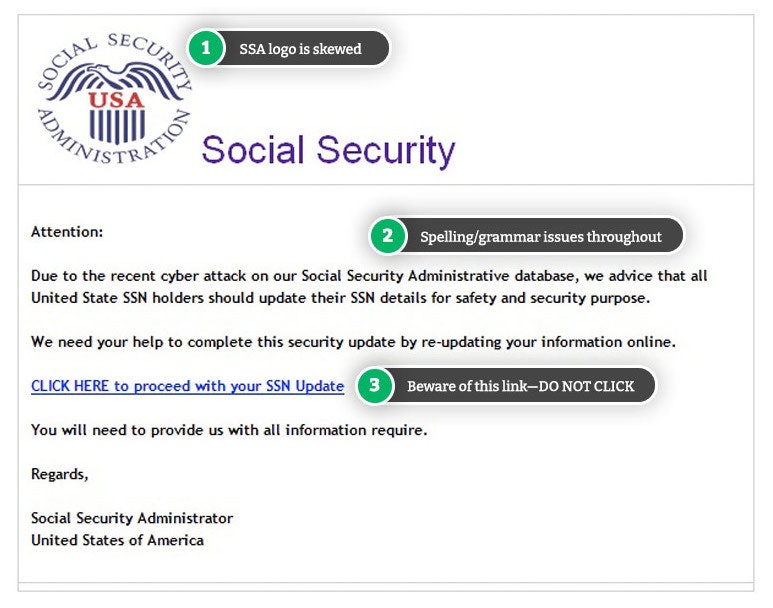- What are Social Security Phishing Scams?
- How to Beat and Avoid Social Security Phishing Scams
- Examples of Social Security Phishing Scams
- Fallen for a Social Security Phishing Scam?
- Frequently Asked Questions
The key to beating Social Security phishing scams is to avoid giving your personal information to anyone over the phone. It's also important to remember that the Social Security Administration won't ever call you on the phone to alert you to a problem with your account or Social Security number (SSN). These phone calls are scams.
What are Social Security Phishing Scams?
A Social Security phishing scam involves a thief pretending to be a government official in an attempt to get you to give them either money or personal financial information. If you give them your financial information, they can use it or sell it to someone else, who can then use it to impersonate you to execute social security fraud or other types of fraudulent activity.
Here's how the scam works.
You Receive a Phone Call
The most common way scammers execute this scam is by pretending to be an employee of the Social Security Administration (SSA) and calling you on the phone. They tell you that they’ve suspended your Social Security number (SSN) because it has been compromised. Before they can “reactivate” it, they will ask you to confirm the number in full (not just the last four digits). They may also ask for additional personal information that they can use to impersonate you online.
The attacker may also ask you to pay a fee to get your SSN back or get a brand new one. The SSA doesn’t “suspend” Social Security numbers, so any call claiming this is false.
In other versions of this phishing scam, you may also receive a fraudulent:
- Robocall
- Postal Mail
Robocall
With a robocall, the scammer uses an automated system to call you, give you a warning about your SSN, and then will provide you with a phone number to call to fix it. The phone number won’t be an official SSA number and will connect you with a live scammer.
Example Scam Robocall MessageHello, this is Linda.
This is the reminder from the Office of the Inspector General of Social Security Administration. Your Social Security number has been suspended. We would request you to get back to us so that we can discuss about this case. Please press "1" now to connect with a representative.
In the email version of this phishing scam, you receive a fake email that looks like it’s from someone who works for the SSA. Similar to the phone call method, the email claims you have to take action to get your number back, have it unsuspended, or get a new one altogether.
You are then invited to click on a link that takes you to a site that looks like the real SSA site. You will be prompted to enter identifying information on the website, such as your:
- Social Security number
- Full name
- Date of birth
- Address
- Other personal details scammers could use to impersonate you, such as where you were born or your parent's name, or your mother’s maiden name
Regular Mail
Using regular mail, the scammer may write a letter asking that you provide your Social Security number, the information for your bank account, or even money.
The Social Security Scammer Steals Your Identity
Once you give the scammer your information, they now have the means to steal your identity, which means they could:
- Charge items to your credit/debit card
- Create accounts under your name
- Take out loans under your name
- Apply for credit cards under your name
If you paid the scammer money, there’s pretty much no chance of you recouping your losses.
How to Beat and Avoid Social Security Phishing Scams
To beat Social Security phishing scams, be wary of any communications, particularly over the phone, that have the following characteristics:
- A threatening conversation. This could come in various forms. For example, they may say you could face fines or imprisonment because someone used your social security number in illegal activity. They could also say that you can lose your social security benefits if you don't act quickly. It’s essential to second-guess any threats you get, especially from people whose identities you can’t confirm.
- A notification that your Social Security number will be, or already has been, suspended. Keep in mind that the SSA doesn’t suspend people’s numbers.
- A demand for immediate payment. If someone says they’re calling from either the Social Security Administration or a law enforcement office claiming you need to pay them, they are lying, and it is a scam. Neither the SSA nor law enforcement officials will ever ask you for money over the phone.
- A demand for payment via cash or electronic means, such as a gift card, wire transfer, or prepaid debit card. These kinds of payments are easy to accept, but they can be hard—and even impossible—to reverse after they’re made, which is why they’re a common request from scammers.
- A request for a gift card number over the phone or through email. Once you issue the number, scammers can use it to extract money or even make payments to themselves or fellow scammers.
- Emails that are sent from a different SSA email address or have other suspicious elements.
Social Security Administration
It's important to verify links and contact details to beat imposters.
If you receive any communications that seem fishy to you or show any of the characteristics of a scam as outlined above, you should:
- Hang up the phone—don't press any numbers to connect with a representative
- Don’t respond to any emails or postal mail
- Don't click any links or visit any website that isn't the official SSA site
- Only call the SSA at their official number (don’t call the number a robocall gave you)
Examples of Social Security Phishing Scams
Fake Social Security emails will use the SSA logo to trick you into thinking it's legit. The goal here is to have you click on a link that takes you to a fake SSA website designed to steal your information. Before clicking the link, hover your mouse over it to see what website it takes you to. If it's not the official SSA website that includes "ssa.gov" in the domain, don't click on it.

It's very common to receive Social Security phishing calls, usually in the form of a robocall. Remember, the SSA won't call you unless you have an already scheduled phone appointment with them.
Fallen for a Social Security Phishing Scam?
If a Social Security scammer has targeted you, it’s essential to report the scam to the SSA. This way, the authorities will be aware of the problem and investigate it, potentially preventing others from falling victim.
Depending on what information you gave to the scammer, you should also:
- Inform your bank and have them cancel your credit/debit cards
- Place a fraud alert on your credit report
- Report the scam to the authorities (e.g., Federal Trade Commission, your local police)
You should also keep a close eye on your bank accounts and credit reports for the next few months to make sure scammers aren’t stealing your money or taking out loans in your name.


Comments